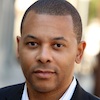01 Mar 2014 Blacks Must Speak Outside the Language of Race (Part 2), by Derryck Green
 Contrary to popular liberal belief, Black Americans don’t speak with one voice.
Contrary to popular liberal belief, Black Americans don’t speak with one voice.
It was the same California blacks who, in 2008, voted for both traditional marriage and Barack Obama — the man who helped craft a U.S. Supreme Court that overturned the popular vote for California’s Proposition 8.
Past polling from Gallup, Pew and the General Social Survey show large numbers of blacks in America self-identified as conservative while also supporting lawmakers who walk rigid liberal political lines, and who often campaign with language steeped in race.
This obsession with race must stop. Black America must become “multilingual” — setting aside a reliance on the outdated language of race.
By speaking in a diverse tongue and about issues rather than skin color, the black community can save itself from becoming a cultural and political afterthought.
For example, blacks can eschew the language of race to speak the language of education: particularly education reform.
It’s not enough to repeat platitudes about needing quality education. Blacks too often support lawmakers who side with unions and the status quo.
Government schools have offered substandard educations to generations of black children, and they will continue to do so until we loudly and defiantly demand reforms such as school choice and teacher accountability.
It was once illegal for blacks to be educated, and people risked life and limb to learn. Risk is no longer necessary, but sacrifice still is!
Black folk must also speak economics. Over the past five years, 29 months saw black unemployment above 15 percent. Last January, black teen unemployment was at 38 percent.
But no amount of government handouts will truly fix our bleak economic reality. Despite having a president who believes government is our savior, black Americans must be exposed to the virtue, dignity and incentive that comes with work and entrepreneurship. From these come wealth and self-sufficiency.
Blacks must re-learn the language of love: of self and others.
The black community accounted for 36 percent of all abortions between 2007 and 2010 — well above our 12.8 percent share of the population. And those babies lucky enough to be born are often raised in communities where they are more likely to die than non-black babies raised in other communities. In turn, disproportionate incarceration and criminal records rise.
Dysfunction is pervasive. Blacks must resuscitate the stigma and shame of illegitimacy, encourage marriage and family and motivate men to demonstrate responsibility and masculinity to succeeding generations.
To waste what our ancestors struggled, fought and died for is inexcusable.
Similarly, blacks must re-learn the language of morality and faith. Today’s self-destructive and immoral behavior would make our ancestors weep and others wonder if they persevered in vain.
In theory, blacks are the most religious of demographics. Many blacks go to services, yet too many otherwise conduct themselves as if allergic to dignity, unable to control their impulses and immune to morality. Civility, etiquette and the rule of law appear to be applicable to everyone but them.
We proudly and loudly engage in our imprudence, with indifference shown toward the values that guarantee success. There is a crutch-like dependence on guilt-ridden racial shakedowns that leverage white guilt to create a perverted notion of power that is rendered without shame.
A casual observer would be hard-pressed to believe blacks come from a rich cultural heritage that was once saturated with a spirit-filled religiosity grounded in biblical Christianity. This faith nourished a strength and resiliency that buttressed souls against the evils, pain and anguish associated with slavery and segregation and later fueled the vigor and tenacity of the Civil Rights movement.
For cultural respectability, moral legitimacy and political relevance, blacks must now become “multilingual” — casting aside the language of race for our own self-preservation. While once rightly considered obligatory, racial rhetoric of a specific articulation, sincerity and urgency is virtually obsolete.
Failing to adapt to new circumstances would be our downfall. It also would be our own fault.
# # #
Derryck Green, a member of the national advisory council of the Project 21 black leadership network, received a M.A. in Theological Studies from Fuller Theological Seminary and is currently pursuing his doctorate in ministry at Azusa Pacific University. Comments may be sent to [email protected].
Published by the National Center for Public Policy Research. Reprints permitted provided source is credited. New Visions Commentaries reflect the views of their author, and not necessarily those of Project 21, other Project 21 members, or the National Center for Public Policy Research, its board or staff.



